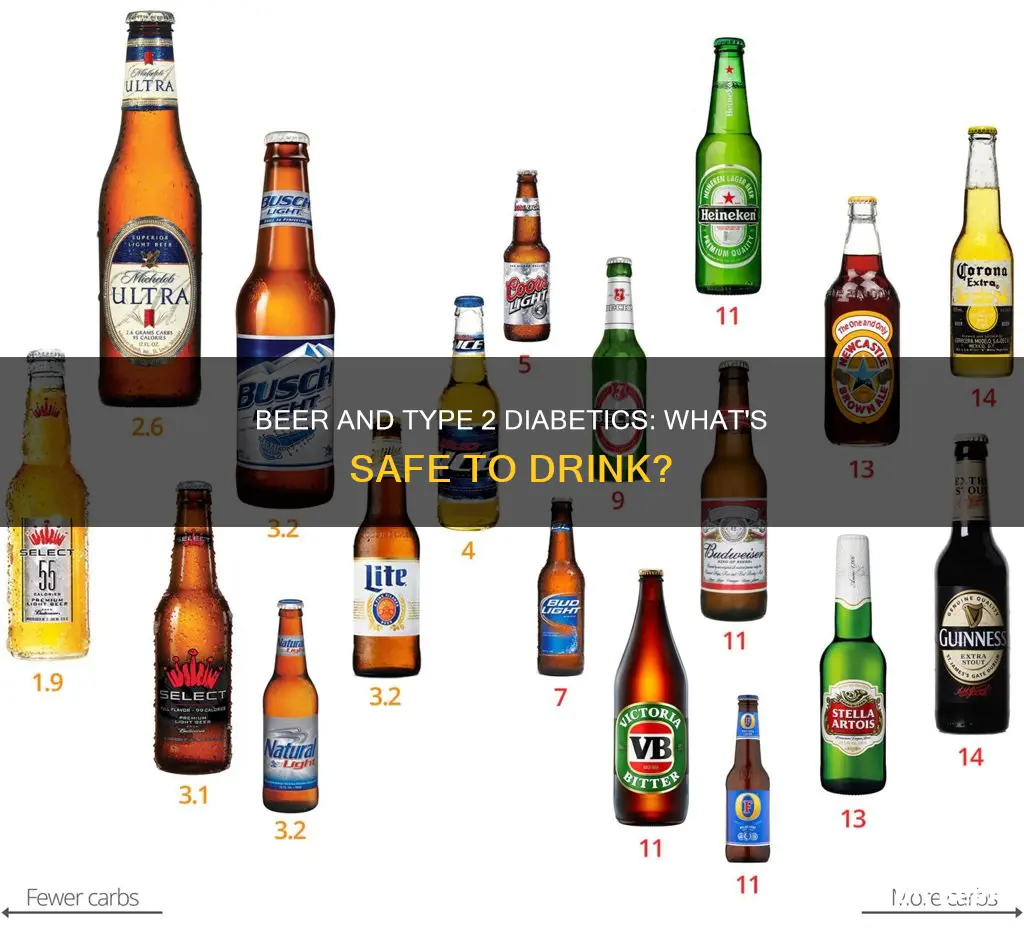
Drinking alcohol can be a complicated topic for people with type 2 diabetes. Alcohol can interfere with blood sugar levels, and for people with type 2 diabetes, managing blood sugar is a priority. Alcohol can also affect weight, as it often contains a lot of calories, and can increase the risk of nerve damage and heart disease. However, some evidence suggests that drinking alcohol may slightly reduce glucose levels and increase good cholesterol, which could lower the risk of heart disease. It is important for people with type 2 diabetes to understand the risks and benefits of drinking alcohol to make informed decisions about their health.
| Characteristics | Values |
|---|---|
| Alcohol consumption for type 2 diabetics | No more than two drinks per day for men and no more than one drink per day for women |
| Drink size | 12 ounces of beer, 5 ounces of wine, or 1.5 ounces of hard liquor |
| Safe to drink? | Depends on blood sugar levels, medications, and complications |
| Risks | Hypoglycemia, increased triglyceride levels, high blood pressure, nerve damage, weight gain |
| Benefits | May lower blood sugar, increase good cholesterol, reduce risk of heart disease |
What You'll Learn

Alcohol can cause hypoglycaemia
The liver is responsible for detoxifying the body of alcohol, and when it is busy breaking down alcohol, it prioritises this over releasing glucose into the bloodstream. This means that when the liver is processing alcohol, it is not regulating blood sugar levels. This is especially significant for people who take insulin or medications that increase insulin production. Insulin lowers blood sugar levels, so when the liver is producing less glucose, medications that increase the amount of insulin in the body may cause blood sugar levels to go too low.
Additionally, alcohol can cause the pancreas to produce more insulin, which can also lead to hypoglycaemia. This is because insulin stimulates the cells to absorb sugar, so when there is more insulin, the cells absorb more sugar, leaving less in the bloodstream.
Drinking alcohol on an empty stomach or when blood sugar levels are already low increases the risk of hypoglycaemia. This is because food slows down the rate at which alcohol is absorbed into the bloodstream. Therefore, drinking alcohol after eating a meal or snack containing carbohydrates can help to prevent hypoglycaemia.
It is important to note that the risk of hypoglycaemia does not go away after you stop drinking; instead, it increases and can last up to 24 hours. This is because alcohol can continue to affect the body and the liver for several hours after consumption. Therefore, it is recommended to monitor blood sugar levels before, during, and after drinking alcohol.
Pouring Beer: Catfish Bait or Urban Myth?
You may want to see also

Alcohol can affect your weight
Secondly, when you consume alcohol, your body prioritises burning it as a fuel source before anything else, including glucose from carbohydrates or lipids from fats. This means that excess glucose and lipids are stored as fat.
Thirdly, alcohol can affect your organs, particularly the liver, which plays a crucial role in metabolising fats, carbohydrates, and proteins. Excessive alcohol consumption can lead to a condition called alcoholic fatty liver, which can damage the liver and affect how your body metabolises and stores carbohydrates and fats.
Additionally, alcohol can contribute to excess belly fat. This is due to the high levels of simple sugars found in beer and other alcoholic drinks, which are quickly converted into fat in the body.
Alcohol can also impair your judgement and lower your inhibitions, making you more likely to make unhealthy food choices. Furthermore, alcohol can affect your hormones, including testosterone, which plays a role in metabolic processes such as muscle formation and fat-burning capabilities.
Finally, alcohol can negatively impact your sleep quality, leading to an imbalance in hormones related to hunger, satiety, and energy storage.
Quint's Jaws Beverage: Beer Choice for the Shark Hunter
You may want to see also

Alcohol can cause hyperglycaemia
The risk of alcohol-induced hyperglycaemia is higher if you drink on an empty stomach or when blood sugar levels are already low. It is also higher for people who are taking insulin or medications like sulphonylureas that increase insulin production. If you drink and take these medications in the evening before bed, you may be at risk of experiencing hyperglycaemia overnight.
To prevent alcohol-induced hyperglycaemia, it is recommended that you do not drink on an empty stomach and that you limit the amount of alcohol you consume. It is also important to drink slowly and to monitor your blood sugar levels while drinking. If your blood sugar levels drop, eat a snack to bring them up.
It is important to note that alcohol can also cause hypoglycaemia (low blood sugar). This is because alcohol can interfere with the liver's ability to produce glucose and can affect blood sugar levels. Therefore, it is crucial to monitor your blood sugar levels before, during, and after drinking alcohol if you have type 2 diabetes.
Kids and Non-Alcoholic Beer: Is It Safe?
You may want to see also

Alcohol can affect your judgement
If you have type 2 diabetes, drinking alcohol may cause your blood sugar to rise or fall. Alcohol can also affect your judgement and willpower, which can lead to poor food choices. It is important to be aware of how alcohol can impact your blood sugar levels and to drink in moderation. Alcohol can also affect your weight, as it is often high in calories. It can be difficult to know how much alcohol will affect your blood sugar, as it varies depending on the type of alcohol and how much you drink.
If you are drinking, it is important to eat a meal or snack with carbohydrates beforehand. This will slow down the rate at which alcohol is absorbed into the bloodstream and help to prevent a rapid drop in blood sugar levels. It is also important to always test your blood sugar levels before and after drinking alcohol, as alcohol can cause hypoglycaemia. This is when your blood sugar drops to dangerously low levels, and it can be life-threatening.
Drinking alcohol can also increase your risk of developing type 2 diabetes. Excess alcohol intake is associated with an increased risk, and it can also lead to weight gain, which is another risk factor. It is important to stay within government guidelines and not to regularly drink more than 14 units of alcohol per week.
If you have type 2 diabetes, it is important to understand the risks and benefits of drinking alcohol. Alcohol can affect your blood sugar levels and interfere with your diabetes medication. It is important to speak to your doctor about how alcohol may impact your condition and to follow their advice.
Drinking Beer in Public: Japanese Laws and Customs Explained
You may want to see also

Alcohol can increase your blood pressure
In most cases, people with type 2 diabetes can drink alcohol in moderation. However, diabetes and alcohol can be a tricky combination. Alcohol can interfere with blood sugar levels, interact with diabetes medications, and affect weight. Excess alcohol intake is also associated with an increased risk of developing type 2 diabetes.
Drinking too much alcohol can lead to raised blood pressure, also known as hypertension. This is the most common alcohol-related health problem, and many people are unaware that they have it. The more alcohol you consume, the higher the risk of hypertension becomes. Even one drink per day can increase the risk.
When you drink, the alcohol affects the muscles in your blood vessels, causing them to narrow. As a result, your heart has to work harder to push blood around your body, which in turn increases your blood pressure.
Drinking regularly, especially if you're over 35, puts you at risk of hypertension. Binge drinking and long-term heavy drinking can also lead to strokes and other cardiovascular issues.
How to Manage Alcohol Consumption with Type 2 Diabetes
If you have type 2 diabetes, it's important to be aware of how alcohol can affect your body and take steps to manage it:
- Always eat a meal or snack containing carbohydrates before drinking alcohol. Food slows down the absorption of alcohol into the bloodstream.
- Test your blood sugar levels before and after drinking. Alcohol can cause blood glucose levels to rise or fall, so it's important to monitor them.
- Be mindful of your drinking pace. Drinking too much, too fast can lead to dizziness, sleepiness, and disorientation—symptoms similar to hypoglycemia.
- Know your limit. Consult your healthcare provider to understand how much alcohol is safe for you. Depending on your health, it may be recommended to avoid alcohol entirely.
- Choose your drinks wisely. Avoid drinks high in sugar and carbs, such as sweet wines and liqueurs. Opt for diet or sugar-free mixers with spirits.
- Stay hydrated. Drinking water before bed can help prevent dehydration and may reduce the risk of a hangover.
- Monitor your blood sugar the morning after drinking. The symptoms of a hangover can be similar to those of a hypo, so check your blood sugar levels and treat accordingly.
Passover Beer: What Jews Can Drink and Avoid
You may want to see also
Frequently asked questions
Yes, type 2 diabetics can drink beer, but only in moderation and when their blood sugar is well-controlled. It is recommended that men have no more than two drinks per day and women have no more than one drink per day.
Beer can affect type 2 diabetics by interfering with their blood sugar levels. Beer contains carbohydrates and alcohol, which can cause blood sugar to rise or fall. Beer also contains a lot of calories, which can impact weight loss efforts.
The risks of drinking beer for type 2 diabetics include hypoglycemia, increased blood pressure, weight gain, and interference with diabetes medications. Alcohol can also increase the risk of nerve damage and heart disease.
Some studies suggest that light-to-moderate drinking may improve blood sugar management and insulin sensitivity in type 2 diabetics. However, it is important to note that chronic heavy drinking and binge drinking should be avoided.
There are several alternatives to beer that may be better options for type 2 diabetics, including plain water, cow's milk, unsweetened coffee and tea, and diet sodas. It is important to speak with a healthcare professional to determine the best beverage choices for managing type 2 diabetes.







